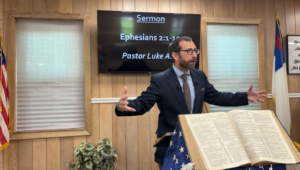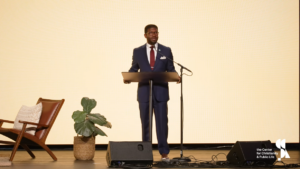Theological Song Review: This Is Our God

Released on January 13, 2023 as the lead single from an upcoming studio album, Phil Wickham’s “This is Our God” peaked at #7 on Billboard’s US Christian Songs chart in April 2023. The song was co-written with Maverick City Music’s Brandon Lake, Pat Barrett, and Elevation Church’s Stephen Furtick.
Note: For a full explanation of the rubric and a primer on our scoring methodology, click here.
It bears repeating that the CCM industry is just that: an industry. It is often assumed by more discerning Christians that Hillsong, Elevation, Bethel, and every other big-name church movement or worship artist is on the warpath trying to infiltrate solid churches with bad doctrine. And yes, these movements peddle bad doctrine. Their “pastors” preach all kinds of prosperity gospel, self-centered, psychologized self-help garbage passed off as true Christian teaching. But in terms of their musical enterprises, the (at best) watered-down content of the music itself is generally not a Trojan horse of falsehood for the purpose of changing what your church believes. In fact, these movements couldn’t care less what your church truly believes as long as their songs find a place in your Sunday rotation. They simply want to increase the money flowing to their organizations and their influence in the larger spiritual marketplace. Doctrinal specificity is narrow and exclusive – the opposite of the broad appeal needed to sell lots of music. Thus, popular songs are written to be empty vessels for a broad, theologically stunted, and self-actualized audience to project their personal desires onto. The most successful songs leave plenty of room for the worshiper to insert their preferences, yet stay Christian-y enough to not trip the alarm bells of doctrinally-concerned Bible believers. The worship artists that are able to lower the doctrinal bar to the level right before vagueness turns into nonsense have successfully crafted the opium of the modern evangelical, and can look forward to their song being played in true churches, false ones, and everywhere in between.
Back to “This is Our God”:
Doctrinal Fidelity and Clarity: The song contains no false teaching, but it does have some clarity issues. While Jesus’s rescue of sinners and his conquering of death are essential truths clearly proclaimed in the lyrics, it is not made clear that the “prison we couldn’t escape” and the “mountains that stood in our way” are not supposed to be our temporal struggles but rather us being dead in our trespasses and sins. The nature of the “fear that took our breath away” in combination with our “weak faith” is similarly open-ended. The bridge does note that Jesus “pulled me out of that grave” and “paid for all of our sin” – a welcome and important specificity that reminds us that there was a price to be paid for violation of God’s perfect standard of righteousness – although it is interesting that the rescue is personal (me) while the sin is less specific (our sin). In this instance, self-focus would be welcome (“Who paid for all of my sin”). 20/25.
Doctrinal Specificity: The CCM tropes of “giants,” “mountains,” “walls,” and other such metaphors being used as one-level abstractions for biblical concepts like “sin,” “death,” and “shame” have become so ubiquitous that one would think songwriters would come up with something new. Yet not only is this not true in “This is Our God,” but Phil Wickham helpfully writes the abstraction process into the lyrics for those uninitiated about how these songs are written. The first lyric, “Remember those walls that we called sin and shame?” flips the comparative upside down, as in truth sin and shame are the realities Wickham is calling “walls” and “prisons.” Of course, walls – like prisons, giants, or mountains – are not the fault of the worshiper, and “This is Our God” generally avoids characterizing us as guilty or responsible for the deadly situation Jesus saved us from. 10/20.
Focus: It would be rhetorically troublesome to call a song “This is Our God,” and then spend the whole song in the first person, and fortunately Wickham writes the lyrics in the second. The lyrics consistently point to Jesus and what Jesus has done for us, leaving little room for the “Jesus is my boyfriend” subjectivity that often comes with vague, personal testimony worship songs. The “God is worship-worthy because I declare Him to be” trap has been avoided in this song. 20/20.
Association: “This is Our God” would have made it into the “PG” (Pastoral Guidance Suggested) category if not for the verifiable false teacher Steven Furtick being one of the songwriters (a credit we suspect is there for the eventual purpose of seeing a 7-minute version of the song on the next Elevation Worship album). See this review of “Do it Again” for the disqualifying issues with Furtick. Having an easily-verifiable false teacher as one of the songwriters is the essence of dangerous association.
Sadly, Phil Wickham (whose parents were part of the Jesus Movement band Parable) has been willing to partner with anyone calling themselves “Christian,” – Hillsong, Elevation, Joyce Meyer, the Mormon-funded The Chosen series, and Roman Catholics are fair game for cooperation for Wickham. As history has shown, he is just as likely to write and release a “Jesus is my Boyfriend” song (like 2016’s The Secret Place) than a theologically solid one. And his rising popularity will only encourage his music to become more ecumenical and generic. 0/20.

Musical Value: To say that we could stack “This is Our God” right on top of 2018’s “Great Things” and 2020’s “Battle Belongs” and they would meld into each other is barely an exaggeration. In fact, if “This is Our God” was released a few months later, we might have assumed that Steven Furtick had asked ChatGPT, “Write a Phil Wickham single.” The by-the-numbers composition and arrangement are attractive enough from a musical standpoint, and being as formulaic as a worship song gets is exactly what the people want. 5/15.
Final Score: 55/100. It would have made it if not for the inexcusable associational baggage. Any worship leader or artist willing to partner with Joyce Meyer and co-write with Steven Furtick simply cannot be trusted, and the associational danger is enough to avoid this song (and sadly Phil Wickham) entirely.







This review is based solely upon an arbitrary standard defined by Mr. Morrill. Any man-made standard will always be arbitrary and biased. Of course, Mr. Morrill’s own songs pass his test. It is very silly to make such posts as this.
God already has a standard for what is acceptable in his worship: “psalms, hymns, and spiritual songs” (Colossians 3:16, Ephesians 5:19). This phrase, in the Greek and to the Greek-speaking audience to whom Paul wrote, was an unequivocal reference to the 150 inspired psalms of the Psalter, particularly in the Septuagint which they would have had access to. Many of these psalms have in the title, “A Psalm” or “A Hymn.” “Spiritual songs” can also be rendered, and ought to be understood, as “songs of the Spirit,” i.e., songs with divine inspiration. Therefore, the only songs that are acceptable in God’s worship are those which have been explicitly prescribed by God, which are the inspired Psalms:
2 Chronicles 29:30 Moreover King Hezekiah and the leaders commanded the Levites to sing praise to the LORD with the words of David and of Asaph the seer. So they sang praises with gladness, and they bowed their heads and worshiped.
According to God’s standard, Mr. Morrill, not only are Phil Whickham’s songs utterly disqualified, but so are yours, and all the man-made hymns of Watts and the rest, which do not come by divine inspiration. Those who bring in elements of their own making into God’s worship are walking in the footsteps of Nadab and Abihu.
While I agree that one should mark and avoid Phil Wickham, it is interesting that the whole topic of music style is avoided. We treat music as if the text and associations are all that there is to it, instead of recognizing that Satan has perverted music just like every other aspect of life. There is music–not words or texts, but MUSIC that is intrinsically evil, comes from the Devil, promotes demon-worship, and is in utter conflict with the holiness of God. Where is this dealt with AT ALL in modern evangelicalism? Evangelicals are drunk with the false teaching that music is neutral, and CCM with all of its aberrations is the result.